中考英语常考易错点专题讲练完成句子和句子翻译含复习资料解析
- 格式:doc
- 大小:49.50 KB
- 文档页数:10
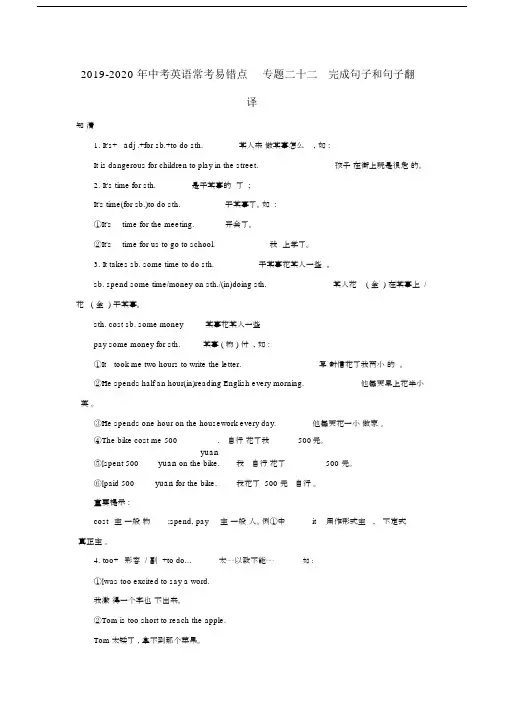
2019-2020 年中考英语常考易错点专题二十二完成句子和句子翻译知清1. It's+ adj .+for sb.+to do sth.某人来做某事怎么 , 如 :It is dangerous for children to play in the street.孩子在街上玩是很危的。
2. It's time for sth.是干某事的了 ;It's time(for sb.)to do sth.干某事了。
如 :①It's time for the meeting.开会了。
②It's time for us to go to school.我上学了。
3. It takes sb. some time to do sth.干某事花某人一些。
sb. spend some time/money on sth./(in)doing sth.某人花 ( 金 ) 在某事上 /花 ( 金 ) 干某事。
sth. cost sb. some money某事花某人一些pay some money for sth.某事 ( 物 ) 付 , 如 :①It took me two hours to write the letter.写封信花了我两小的。
②He spends half an hour(in)reading English every morning.他每天早上花半小英。
③He spends one hour on the housework every day.他每天花一小做家。
④The bike cost me 500.自行花了我500元。
yuan⑤I spent 500yuan on the bike.我自行花了500 元。
⑥I paid 500yuan for the bike.我花了 500 元自行。
重要提示 :cost主一般物;spend, pay主一般人。
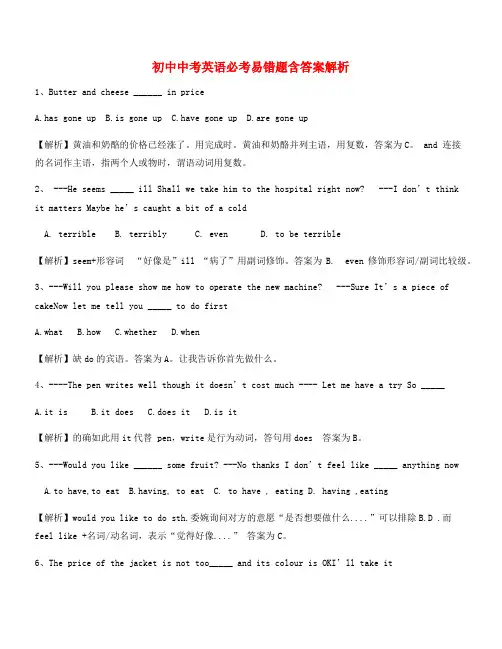
初中中考英语必考易错题含答案解析1、Butter and cheese ______ in priceA.has gone upB.is gone upC.have gone upD.are gone up【解析】黄油和奶酪的价格已经涨了。
用完成时。
黄油和奶酪并列主语,用复数,答案为C。
and 连接的名词作主语,指两个人或物时,谓语动词用复数。
2、 ---He seems _____ ill Shall we take him to the hospital right now? ---I don’t thinkit matters Maybe he’s caught a bit of a coldA. terribleB. terriblyC. evenD. to be terrible【解析】seem+形容词“好像是”ill “病了”用副词修饰。
答案为B. even修饰形容词/副词比较级。
3、---Will you please show me how to operate the new machine? ---Sure It’s a piece of cakeNow let me tell you _____ to do firstA.whatB.howC.whetherD.when【解析】缺do的宾语。
答案为A。
让我告诉你首先做什么。
4、----The pen writes well though it doesn’t cost mu ch ---- Let me have a try So _____A.it isB.it doesC.does itD.is it【解析】的确如此用it代替 pen,write是行为动词,答句用does 答案为B。
5、---Would you like ______ some fruit? ---No thanks I don’t feel like _____ anything nowA.to have,to eatB.having, to eatC. to have , eatingD. having ,eating【解析】would you like to do sth.委婉询问对方的意愿“是否想要做什么....”可以排除B.D .而feel like +名词/动名词,表示“觉得好像....” 答案为C。
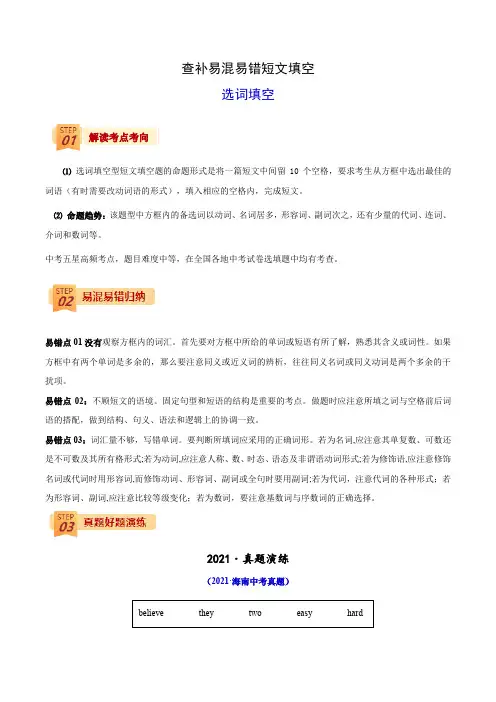
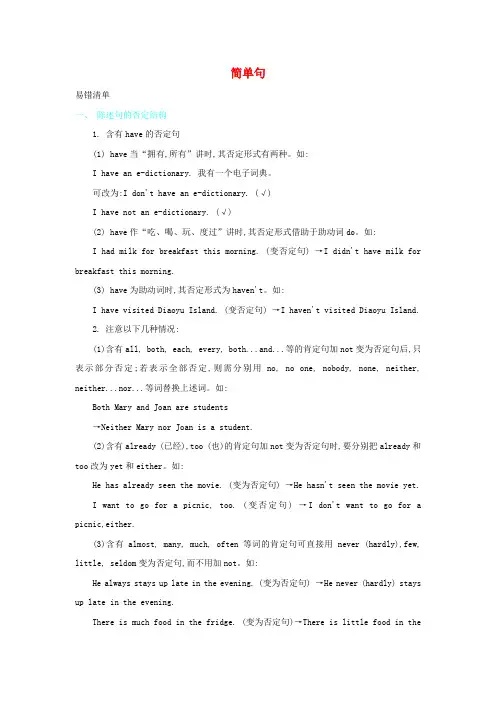
简单句易错清单一、陈述句的否定结构1. 含有have的否定句(1) have当“拥有,所有”讲时,其否定形式有两种。
如:I have an e-dictionary. 我有一个电子词典。
可改为:I don't have an e-dictionary. (√)I have not an e-dictionary. (√)(2) have作“吃、喝、玩、度过”讲时,其否定形式借助于助动词do。
如:I had milk for breakfast this morning. (变否定句) →I didn't have milk for breakfast this morning.(3) have为助动词时,其否定形式为haven't。
如:I have visited Diaoyu Island. (变否定句) →I haven't visited Diaoyu Island.2. 注意以下几种情况:(1)含有all, both, each, every, both...and...等的肯定句加not变为否定句后,只表示部分否定;若表示全部否定,则需分别用no, no one, nobody, none, neither, neither...nor...等词替换上述词。
如:Both Mary and Joan are students→Neither Mary nor Joan is a student.(2)含有already (已经),too (也)的肯定句加not变为否定句时,要分别把already和too改为yet和either。
如:He has already seen the movie. (变为否定句) →He hasn't seen the movie yet.I want to go for a picnic, too. (变否定句) →I don't want to go for a picnic,either.(3)含有almost, many, much, often等词的肯定句可直接用never (hardly),few, little, seldom变为否定句,而不用加not。
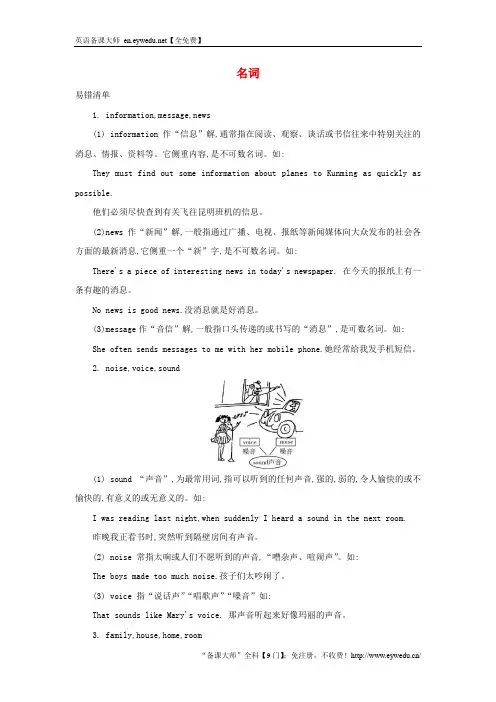
名词易错清单1. information,message,news(1) information作“信息”解,通常指在阅读、观察、谈话或书信往来中特别关注的消息、情报、资料等。
它侧重内容,是不可数名词。
如:They must find out some information about planes to Kunming as quickly as possible.他们必须尽快查到有关飞往昆明班机的信息。
(2)news作“新闻”解,一般指通过广播、电视、报纸等新闻媒体向大众发布的社会各方面的最新消息,它侧重一个“新”字,是不可数名词。
如:There's a piece of interesting news in today's newspaper. 在今天的报纸上有一条有趣的消息。
No news is good news.没消息就是好消息。
(3)message作“音信”解,一般指口头传递的或书写的“消息”,是可数名词。
如:She often sends messages to me with her mobile phone.她经常给我发手机短信。
2. noise,voice,sound(1) sound “声音”,为最常用词,指可以听到的任何声音,强的,弱的,令人愉快的或不愉快的,有意义的或无意义的。
如:I was reading last night,when suddenly I heard a sound in the next room.昨晚我正看书时,突然听到隔壁房间有声音。
(2) noise 常指太响或人们不愿听到的声音,“嘈杂声、喧闹声”。
如:The boys made too much noise.孩子们太吵闹了。
(3) voice 指“说话声”“唱歌声”“嗓音”如:That sounds like Mary's voice. 那声音听起来好像玛丽的声音。
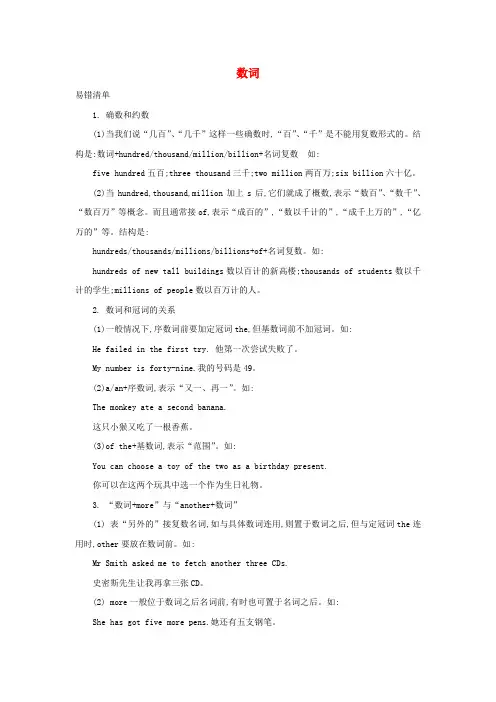
数词易错清单1. 确数和约数(1)当我们说“几百”、“几千”这样一些确数时,“百”、“千”是不能用复数形式的。
结构是:数词+hundred/thousand/million/billion+名词复数如:five hundred五百;three thousand三千;two million两百万;six billion六十亿。
(2)当hundred,thousand,million加上s后,它们就成了概数,表示“数百”、“数千”、“数百万”等概念。
而且通常接of,表示“成百的”,“数以千计的”,“成千上万的”,“亿万的”等。
结构是:hundreds/thousands/millions/billions+of+名词复数。
如:hundreds of new tall buildings数以百计的新高楼;thousands of students数以千计的学生;millions of people数以百万计的人。
2. 数词和冠词的关系(1)一般情况下,序数词前要加定冠词the,但基数词前不加冠词。
如:He failed in the first try. 他第一次尝试失败了。
My number is forty-nine.我的号码是49。
(2)a/an+序数词,表示“又一、再一”。
如:The monkey ate a second banana.这只小猴又吃了一根香蕉。
(3)of the+基数词,表示“范围”。
如:You can choose a toy of the two as a birthday present.你可以在这两个玩具中选一个作为生日礼物。
3. “数词+more”与“another+数词”(1) 表“另外的”接复数名词,如与具体数词连用,则置于数词之后,但与定冠词the连用时,other要放在数词前。
如:Mr Smith asked me to fetch another three CDs.史密斯先生让我再拿三张CD。
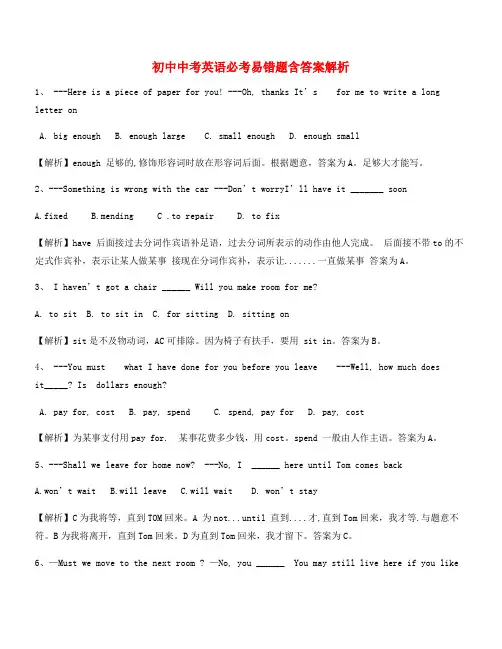
初中中考英语必考易错题含答案解析1、 ---Here is a piece of paper for you! ---Oh, thanks It’s for me to write a long letter onA. big enoughB. enough largeC. small enoughD. enough small【解析】enough 足够的,修饰形容词时放在形容词后面。
根据题意,答案为A。
足够大才能写。
2、---Something is wrong with the car ---Don’t worryI’ll have it _______ soonA.fixedB.mending C .to repair D. to fix【解析】have 后面接过去分词作宾语补足语,过去分词所表示的动作由他人完成。
后面接不带to的不定式作宾补,表示让某人做某事接现在分词作宾补,表示让.......一直做某事答案为A。
3、I haven’t got a chair ______ Will you make room for me?A. to sitB. to sit inC. for sittingD. sitting on【解析】sit是不及物动词,AC可排除。
因为椅子有扶手,要用 sit in。
答案为B。
4、 ---You must what I have done for you before you leave ---Well, how much doesit_____? Is dollars enough?A. pay for, costB. pay, spendC. spend, pay forD. pay, cost【解析】为某事支付用pay for. 某事花费多少钱,用cost。
spend 一般由人作主语。
答案为A。
5、---Shall we leave for home now? ---No, I ______ here until Tom comes backA.won’t waitB.will leaveC.will waitD. won’t stay【解析】C为我将等,直到TOM回来。
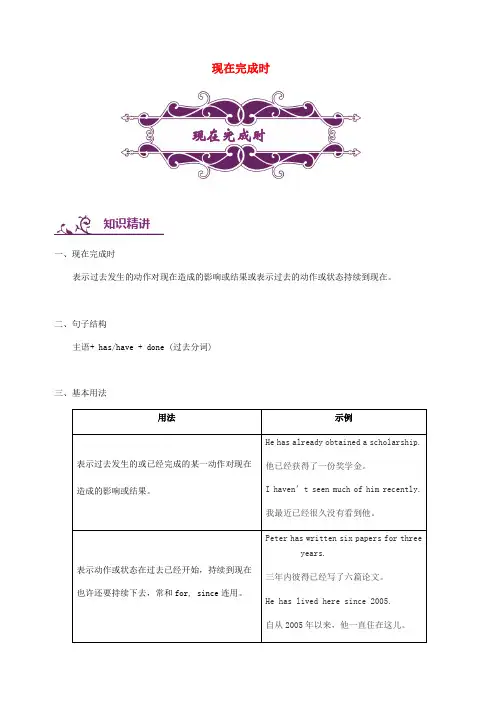
现在完成时现在完成时知识精讲一、现在完成时表示过去发生的动作对现在造成的影响或结果或表示过去的动作或状态持续到现在。
二、句子结构主语+ has/have + done (过去分词)三、基本用法四、时间状语1. yet (常用于否定或疑问句中), already (常用于肯定句中)2. since+过去时间点/过去时的从句(译为:自从…以来)3. for+时间段4. just, so far, recently, never, ever, twice…5. in the past / last few days五、动词过去分词的规则变化六、动词过去分词的不规则变化:七、相关句式八、瞬间动词和延续性动词之间的转换:在完成时中,一个瞬间动词不能直接与表示一段时间的状语(for, since等)连用。
此时须将该瞬间动词改为延续性动词或状态动词:例:The film began five minutes ago.---The film has been on for five minutes.---It has been five minutes since the film began.用“be+形容词”代终止性动词1. “ be+married”代替marry2. “be+ill”代替fall (get) ill3. “be+dead”代替die4. “be+asleep”代替fall (get) asleep5. “be+awake”代替wake/wake up6. “be+gone”代替lose, die, sell, leave7. “be+open”代替open8. “be closed”代替close/shut用“be+副词”代终止性动词1. “be+on”代替start, begin2. “be+up”代替get up3. “be+back(to)”代替return to, come back to, go back to4. “be here (there)”代替come(arrive, reach, get) here或go (arrive, reach, get) there等等用“be+介词短语”代终止性动词1.”be in/at +地点”代替go to /come to2.”用be in the army”代替join the army3.”be in/at +地点”代替move to三点剖析一、考点:现在完成时的基本用法和时间状语;以及动词过去分词的变化规则。
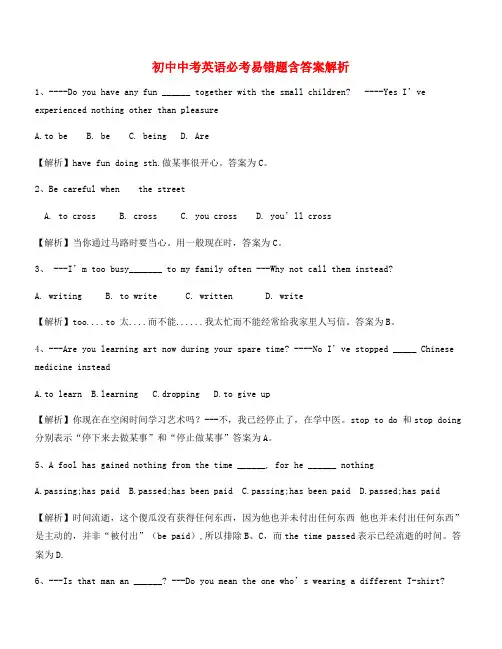
初中中考英语必考易错题含答案解析1、----Do you have any fun ______ together with the small children? ----Yes I’ve experienced nothing other than pleasureA.to beB. beC. beingD. Are【解析】have fun doing sth.做某事很开心。
答案为C。
2、Be careful when the streetA. to crossB. crossC. you crossD. you’ll cross【解析】当你通过马路时要当心。
用一般现在时,答案为C。
3、 ---I’m too busy_______ to my family often ---Why not call them instead?A. writingB. to writeC. writtenD. write【解析】too....to 太....而不能......我太忙而不能经常给我家里人写信。
答案为B。
4、---Are you learning art now during your spare time? ----No I’ve stopped _____ Chinese medicine insteadA.to learnB.learningC.droppingD.to give up【解析】你现在在空闲时间学习艺术吗?---不,我已经停止了,在学中医。
stop to do 和stop doing 分别表示“停下来去做某事”和“停止做某事”答案为A。
5、A fool has gained nothing from the time ______, for he ______ nothingA.passing;has paidB.passed;has been paidC.passing;has been paidD.passed;has paid 【解析】时间流逝,这个傻瓜没有获得任何东西,因为他也并未付出任何东西他也并未付出任何东西”是主动的,并非“被付出”(be paid),所以排除B、C,而the time passed表示已经流逝的时间。
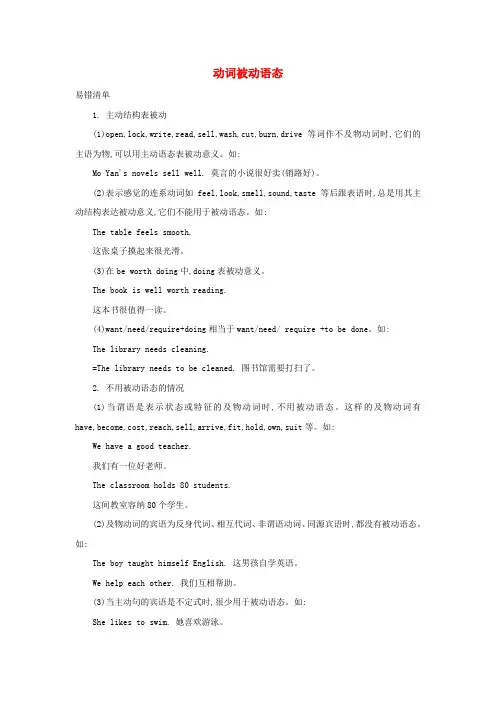
动词被动语态易错清单1. 主动结构表被动(1)open,lock,write,read,sell,wash,cut,burn,drive等词作不及物动词时,它们的主语为物,可以用主动语态表被动意义。
如:Mo Yan's novels sell well. 莫言的小说很好卖(销路好)。
(2)表示感觉的连系动词如feel,look,smell,sound,taste等后跟表语时,总是用其主动结构表达被动意义,它们不能用于被动语态。
如:The table feels smooth.这张桌子摸起来很光滑。
(3)在be worth doing中,doing表被动意义。
The book is well worth reading.这本书很值得一读。
(4)want/need/require+doing相当于want/need/ require +to be done。
如:The library needs cleaning.=The library needs to be cleaned. 图书馆需要打扫了。
2. 不用被动语态的情况(1)当谓语是表示状态或特征的及物动词时,不用被动语态。
这样的及物动词有have,become,cost,reach,sell,arrive,fit,hold,own,suit等。
如:We have a good teacher.我们有一位好老师。
The classroom holds 80 students.这间教室容纳80个学生。
(2)及物动词的宾语为反身代词、相互代词、非谓语动词、同源宾语时,都没有被动语态。
如:The boy taught himself English. 这男孩自学英语。
We help each other. 我们互相帮助。
(3)当主动句的宾语是不定式时,很少用于被动语态。
如:She likes to swim. 她喜欢游泳。
3. 被动语态与系表结构的区别动词“be+过去分词”这一结构既可以是被动语态,也可以是系表结构。
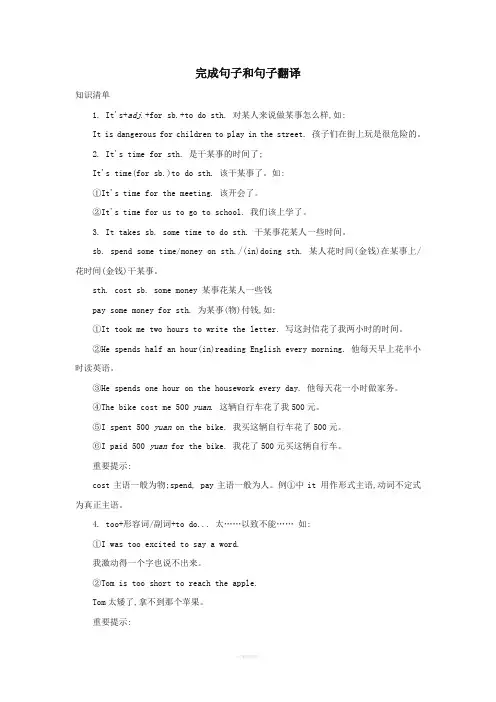
完成句子和句子翻译知识清单1. It's+adj.+for sb.+to do sth. 对某人来说做某事怎么样,如:It is dangerous for children to play in the street. 孩子们在街上玩是很危险的。
2. It's time for sth. 是干某事的时间了;It's time(for sb.)to do sth. 该干某事了。
如:①It's time for the meeting. 该开会了。
②It's time for us to go to school. 我们该上学了。
3. It takes sb. some time to do sth. 干某事花某人一些时间。
sb. spend some time/money on sth./(in)doing sth. 某人花时间(金钱)在某事上/花时间(金钱)干某事。
sth. cost sb. some money 某事花某人一些钱pay some money for sth. 为某事(物)付钱,如:①It took me two hours to write the letter. 写这封信花了我两小时的时间。
②He spends half an hour(in)reading English every morning. 他每天早上花半小时读英语。
③He spends one hour on the housework every day. 他每天花一小时做家务。
④The bike cost me 500 yuan. 这辆自行车花了我500元。
⑤I spent 500 yuan on the bike. 我买这辆自行车花了500元。
⑥I paid 500 yuan for the bike. 我花了500元买这辆自行车。
重要提示:cost主语一般为物;spend, pay主语一般为人。
初中中考英语必考易错题含答案解析1、 ---How long ____ you ____a fever? ---Ever since last nightA. have, gotB. have, hadC. have, caughtD. did, have【解析】根据后面的since我们可以判断要用完成时。
而get,catch等瞬间动词在完成时中不能与for,since引导的时间状语连用,答案是B.2、A third of the population of the city _______ their own carsA.hasB.haveC.hadD.is【解析】population做主语时,如果主语表示人口的百分之几,几分之几时,谓语动词用复数。
答案为B。
3、 ---How many English words had you learned _____ the end of last term? ---Around , but I’ve forgotten most o f themA. byB. atC. toD. on【解析】By the end of 到....为止如果后面接将来时间,主句用将来时,如果后面是现在时间,主句用现在完成时,如果是过去时间,主句用过去完成时。
At the end of “在...尽头”后面接时间时,一般用过去时或将来时。
答案为A。
4、 ---Excuse me, but I don’t think you can take photos here ---Sorry I ____ this is no-photo zoneA. don’t knowB. didn’t knowC. have no ideaD. haven’t known【解析】根据题目意思可看出对方是以前不知道这里是不允许照相的区域,用过去时,答案为B。
5、______ Yancheng today is more beautiful now MrJackson said he would visit it ______ fourth timeA.The;/B.The;theC./;aD.The;a【解析】因为这里的“盐城”是特指“现在的盐城”(The Yancheng today),所以可以说 the Yanchenga fourth 再一次,说明以前已经来了3次了,还计划来一次,就是第4次。
初中中考英语必考易错题含答案解析1、Mr Green living in China though he was born in LondonA. would likeB. wantsC. hatesD. enjoys【解析】尽管Mr Green出生在伦敦,但是他喜欢居住在中国。
答案为D。
would like sth. 想要什么would like to do sth.喜欢做某事 want to do sth.想做某事2、----I don’t think your team can beat theirs ----____But we could if Lin Tao were on the teamA. No,we can’tB.Yes ,we can’tC. Yes,we canD.No, we can【解析】上面的观点是我认为你的队不会打败他们的队。
回答方说如果林涛在的话可能会赢。
那么是同意对方的观点,没有打败他们的队。
前否后肯的反意疑问句用no来同意对方的观点,是的,我们没有打败他们。
答案为A。
3、 Someone is knocking at the door It ____my mother It's time for her to be backA. can beB. may not beC. must beD. mustn’t be【解析】can 表示推测是用于否定句中,表示否定猜测“不可能” 根据题意,是妈妈回来的时候了,表示肯定猜测,用must 答案选C4、 When you ____the street, you must look firstA. acrossB. go crossC. crossD. goes across【解析】过街,过河,过桥都用动词cross或go across 但是you是第2人称,不能用goes. 答案为C5、 ______noisy children! Go and ask them to keep quietA. HowB. WhatC. What aD. How a【解析】children 是复数形式,C.D可排除,此句的中心词是名词,用what修饰,答案为B。
名师课件中考英语必考易错题含答案解析1、 ---I’m sorry to have kept you waiting long ---Never mind I ____ here for only a few minutesA. have beenB. have comeC. have arrivedD. waited【解析】因为come,arrive是瞬间动词,在用于现在完成时时,不能与表示一段的for,since构成的时间状语连用。
答案为A。
2、 ---Did you stop hello to Mrs Smith ? ---No, I didn’t see her when she went pastA. sayingB. saidC. sayD. to say【解析】stop to do sth 停下来去做某事 stop doing sth.停止做某事根据题目意思答案为D。
她经过时我没看见,所以我没有停下来去向史密斯夫人问好。
3、 The man ____France will give us a talk ____his countryA. from, onB. of, inC. of, aboutD. from, of【解析】from 来自.... of一般是用于所有格 on和about在这里都可以,这个来自法国的男人将给我们做个关于他的国家的演讲答案选A4、 David was born _____A.since twenty years agoB.for twenty yearsC.twenty years agoD.just over twenty 【解析】years born是瞬间动词,不与一段时间连用。
故答案C5、A fool has gained nothing from the time ______, for he ______ nothingA.passing;has paidB.passed;has been paidC.passing;has been paidD.passed;has paid 【解析】时间流逝,这个傻瓜没有获得任何东西,因为他也并未付出任何东西他也并未付出任何东西”是主动的,并非“被付出”(be paid),所以排除B、C,而the time passed表示已经流逝的时间。
初中中考英语必考易错题含答案解析1、---Why did you come back so late today ? ----Because it______heavily when the meeting was over We had to wait until it came to a stopA.was raining B .is raining C.rained D.rains【解析】整个对话都是过去时。
排除B.D。
表示正在进行的事,用进行时。
答案为A。
2、He is so fat that the chair is not large enough for him to_____A.sitB.sit onC.sit downD.take a seat【解析】因为是坐在凳子上,指的是表面,所以要用on 答案B3、 ---You’ve dropped _____ “s’’ in the word “acros’’ ---Oh, ____ letter “s’’ should be doubled like thi s “across’’A. a, aB. an, aC. a, theD. an, the【解析】本题考查冠词的用法。
表示泛指时用不定冠词,a 用在辅音发音字母之前,an用在元音发音字母之前。
s的读音为/es/,为元音发音。
应用“an”,后面表特指,上面出现的,应用"the",答案为D.4、 When you ____the street, you must look firstA. acrossB. go crossC. crossD. goes across【解析】过街,过河,过桥都用动词cross或go across 但是you是第2人称,不能用goes. 答案为C5、It’s time for Meimei and ______ to the Palace MuseumA.I goingB.I to goC.me goingD.me to go【解析】It’s time for sb. to do sth. 是做...的时间了答案为D。
初中中考英语必考易错题含答案解析1、 The weather was ______ it is todayA. not as wetter asB. not wetter thanC. more wetter thanD. wetter as【解析】as...as 同级比较,中间用形容词或副词原形 more用于多音节或少数双音节词前表示比较 D 应该是wetter than ,故答案选B2、The teacher said ______ wanted to go to the cinema must be there before :,A.those whoB.thatC.whoD.which【解析】老师说那些想去看电影的必须在6点前到。
who wanted to to go the cinema作定语修饰those.同时those后面这句话为said的宾语,为宾语从句,those在宾语从句中作主语,those must be there before 6:00。
答案为A。
3、 They were very proud______ their daughterA. forB. ofC. withD. About【解析】be proud of为...骄傲 take pride in 为...骄傲,答案选B4、 ---I’m sorry to have kept you waiting long ---Never mind I ____ here for only a few minutesA. have beenB. have comeC. have arrivedD. waited【解析】因为come,arrive是瞬间动词,在用于现在完成时时,不能与表示一段的for,since构成的时间状语连用。
答案为A。
5、----I don’t think your team can beat theirs ----____But we could if Lin Tao were on the teamA. No,we can’tB.Yes ,we can’tC. Yes,we ca nD.No, we can【解析】上面的观点是我认为你的队不会打败他们的队。
短文填空知识清单一、考点分析短文填空要求考生根据所给短文内容考查考生对短文的理解和词汇的掌握情况。
主要测试理解能力和词汇的运用能力。
考查内容一般涉及以下方面:1. 对短文内容的判断短文填空的题材多样,包括幽默故事、人物传记、科普小品、新闻报道、历史文化、人生哲理等。
有的贴近学生生活实际,能激发学生的学习热情,启发他们的思维。
有的介绍最新的科研动态和科研成果等特点、用途等。
有的讲述人生哲理,给人以启迪。
2. 对词性、单词适当形式和短文内容的判断短文填空的考查形式主要以选词填空、首字母填空为主,兼顾中文提示和单词的适当形式。
单词的适当形式有名词的单复数形式,时态和语态和非谓语形式以及选择句子填空。
难度较大的是根据短文内容完成短文。
答题时,可以适当参考阅读理解的解题步骤和技巧。
3. 对其他方面的判断。
短文填空对其他方面的判断出现的频率较低,多数文章不设此类题目。
主要是在解题时,考生了解其要点或未尽事宜,以便判断文章内容或来源,以便推测前后可能出现的内容;这就要求考生对文章有更深层次的理解。
二、解题步骤1. 阅读原文、捕捉信息、理解大意。
先通读原文,捕捉文中所提供的信息,抓住文章内容概略,理解短文的大意和理清全文脉络。
2. 审读题目、找出相关依据判断。
读懂短文内容后再审读题目,把握每个待判定句子的含义,通过寻读法在原文中找出与每个问题相关的段落与词句,然后依据短文内容对试题所给出的句子进行是非判断。
3. 重读短文,逐题复检、核查无误。
完成正误判断后必须将短文重读一遍,加深对短文的理解,在此基础上再对每一道题进行复查,对有些似是而非的句子,一定要重新认真识别。
尤其对于深层理解的句子,原文没有提供直接或间接的答案,我们应仔细斟酌,复读文章,敲定最后答案。
提分策略怎么做好短文填空是考生复习最关心的问题。
短文填空尽管以不同的形式出现,但是解题时却有很多相同之处。
解题时需要注意以下几点:1. 通读全文,弄清短文大意。
完成句子和句子翻译知识清单1. It's+adj.+for sb.+to do sth. 对某人来说做某事怎么样,如:It is dangerous for children to play in the street. 孩子们在街上玩是很危险的。
2. It's time for sth. 是干某事的时间了;It's time(for sb.)to do sth. 该干某事了。
如:①It's time for the meeting. 该开会了。
②It's time for us to go to school. 我们该上学了。
3. It takes sb. some time to do sth. 干某事花某人一些时间。
sb. spend some time/money on sth./(in)doing sth. 某人花时间(金钱)在某事上/花时间(金钱)干某事。
sth. cost sb. some money 某事花某人一些钱pay some money for sth. 为某事(物)付钱,如:①It took me two hours to write the letter. 写这封信花了我两小时的时间。
②He spends half an hour(in)reading English every morning. 他每天早上花半小时读英语。
③He spends one hour on the housework every day. 他每天花一小时做家务。
④The bike cost me 500 yuan. 这辆自行车花了我500元。
⑤I spent 500 yuan on the bike. 我买这辆自行车花了500元。
⑥I paid 500 yuan for the bike. 我花了500元买这辆自行车。
重要提示:cost主语一般为物;spend, pay主语一般为人。
例①中it 用作形式主语,动词不定式为真正主语。
4. too+形容词/副词+to do... 太……以致不能……如:①I was too excited to say a word.我激动得一个字也说不出来。
②Tom is too short to reach the apple.Tom太矮了,拿不到那个苹果。
重要提示:这是一个否定句型,不能在不定式前加 not,可以用so... that... 结构改写。
例句①可以改写成:I was so excited that I couldn’t say a word.5. so that... 以便/以致……如:①They studied hard so that they could pass the exam. 为了能通过考试,他们学习很努力。
②They started early so that they caught the early bus. 他们起得很早,结果赶上了早班车。
重要提示:在例句①中,是引导目的状语;在例句②中,是引导结果状语。
一般来讲,若从句中含有情态动词,则so that引导的为目的状语。
若无情态动词,则so that引导的为结果状语。
6. 祈使句+then/or/and+陈述句如:①Work hard,and/then/and then you will live a happy life. 努力工作,你就会过上幸福的生活。
②Hurry up,or we will be late for school. 快点,否则我们上学就迟到了。
注意:以上句型都可以用条件状语从句来改写。
例句②可以改写成:If we don't hurry up,we'll be late for school.7. Why not do...? 为什么不……?Let's do... 让我们做……吧。
Shall we do...?我们做……好吗?Would you like/to do...?你想要(做)……吗?Will you please do...?请你做……好吗?What(How)about doing...?做……怎么样?had better do/not do sth.最好做/不做某事。
如:①—Why not go and ask our teacher?——为什么不去问问老师?—Good idea! Let's go. ——好主意!走吧!②—Shall we go out for a walk? ——我们去散步怎么样?—No,Let's go to the zoo. ——不,我们去动物园吧。
③Will you please fetch some chalks for me? 请你给我拿些粉笔,好吗?④—What about singing an English song? ——唱首英文歌曲怎么样?—Wonderful! ——好极了!⑤You had better put on the coat when you go out. 你出去时最好把外套穿上。
8. I don't think his answer is right.我认为他的答案不对。
如:①I can't believe she is right. 我相信她是不对的。
②You don't think they will come tomorrow,do you? 你认为他们明天不会来,是吗?重要提醒:think,believe,suppose等接宾语从句,表示否定时否定主句。
变为反意疑问句时,若主语是第一人称,简短问句与宾语从句的主谓语保持一致,若主句主语是其他人称,与主句主谓语保持一致。
例句①变为反意疑问句应为:I can't believe she is right,is she?9. such+名词性词组+that...;so+形容词/副词+that... 如此……以致……如:①She is such a good teacher that we all love her. 她是一个好老师,我们都爱她。
②It was such a hot day that they didn't go out for a walk as usual. 这么热的天气,他们没有像往常一样去散步。
重要提醒:(1)“such+a(an)+形容词+名词+that...”,可以改写成“so+形容词+a(an)+名词+that...”,例句①可以改写成:She is so good a teacher that we all love her.(2)在“such+形容词+名词复数或不可数名词+that...”结构中,形容词如果是many/few 或much/little时,用so不用such,即:so+many/few+可数名词复数+that... ,so+much/little+不可数名词+that... 。
如:①There are so many people in the room that I can't get in.房间里人太多,我进不去。
②The man has so much money that he can buy a car.那人很有钱,他能买一辆小汽车。
10. there be...;either... or...;neither... nor...;not only... but also... 如:①There is a pen and two pencils in his pencil-box. 他的铅笔盒里有一支钢笔和两支铅笔。
②Not only you but also I want to go travelling.不但你,我也想去旅游。
③Either you or I am leaving for Shanghai.要么你去上海,要么我去上海。
④Neith er you nor he is right. 你和他都不对。
⑤Both Jack and Tim are English. Jack和Tim都是英国人。
重要提示:当这几个句型连接主语时,谓语动词的人称和数要遵循“就近原则”。
对比both... and... 来记忆,both... and... 连接主语时视为复数。
11. enough+名词+to do... 有足够的……做某事;形容词/副词+enough+to do... 足够……做某事。
如:①There is enough room to hold these people to have a meeting. 这儿有足够的地方容下这些人开会。
②The boy is strong enough to carry the heavy box. 这个男孩儿力气够大,能搬动这只箱子。
重要提示:enough作副词修饰形容词或副词时,放在所修饰词的后面,句子可以用so... that... 句型改写。
例句②可以改写为:The boy is so strong that he can carry the heavy box.12. enjoy doing sth. 喜欢(爱好)做某事;like to do/like doing sth. 喜欢做某事。
如:①Do you enjoy listening to music? 你喜欢听音乐吗?②I like to swim in the swimming pool. 我喜欢在游泳池中游泳。
(喜欢到某一具体的地方游泳)③I like swimming. 我喜欢游泳。
(只讲喜欢这项运动)提分策略纵观全国各地中考英语试题的句子翻译题,其考查的重点为:各类重要句型结构及搭配、重点词的用法及习惯表达、主要语法规则及其运用等,为了便于评分,大多题型用“翻译填空”即“完成句子”来考查学生“译”的能力,此种题型一般占试卷总分的百分之十左右。
解答这类试题,考生需要注意以下方面:1. 要明确命题意图,做到有的放矢。
一般说来,句子翻译都有个明显的考查意图,要么是考查某个词的用法或习惯表达,要么是考查某个句型的结构或搭配,或者是考查某条语法规则的具体运用,等等。
在做题时若能明确命题者的考查意图,那么便可加强做题的针对性,从而做到有的放矢。
2. 要注意英语的习惯表达以及英汉两种语言的不同之处。
由于历史、文化等方面的原因,英汉两种语言在用词选句等方面有许多不同之处,这一点考生一定要引起足够的重视,千万不要用汉语的习惯硬套英语句型。
比如:汉语中常说“希望/建议/同意/拒绝某人做某事”,但英语习惯上却不能 hope/suggest/agree/refuse sb. to do sth.;又比如:汉语中的“红茶”,按英语的习惯是说成 black tea,而不是对应地说成red tea。